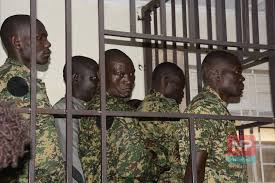By CHANGE OF GUARDS
Acholiland and the Acholi tribe, in particular, have dominated military service in Uganda since the colonial and post-independence eras. In almost all of the political crises the country has faced, the Acholi military’s influence played a crucial role. Idi Amin’s military takeover was largely based on the alleged attempt by then-president Obote to create a personal army comprised of Acholi and Langi. Indeed, these two ethnic groups bore the brunt of Idi Amin’s regime, as they went into armed rebellion. The so-called Kikosi Malum (Special Unit), which fought alongside the Tanzanian army to oust Idi Amin, was composed entirely of Acholi and Langi soldiers.
Forget about Museveni’s briefcase organization, the so-called FRONASA, which had fewer than 20 personnel. It was the Acholi who dominated the armed wing of the exiles.
Following the fall of Idi Amin, as Minister of Defense, Museveni sought to outnumber the Acholi by boosting his FRONASA ranks with Westerners and Bantu, in particular. His scheme was cut short when he was subsequently sacked from the defense docket. Desperately, he turned to the 1980 general elections with the sole aim of tapping into the Baganda’s resentment against the UPC and Obote, especially following the 1966 Buganda Crisis. After his humiliating defeat at the polls, he resorted to an armed rebellion in the Luwero region, where the enemy was clearly defined as the Acholi, whose sons paid a heavy price on the battlefield.
Unfortunately, the Acholi in the army accused their Langi counterparts of leaving them to do the hard work. This tension led to the Acholi overthrowing the UPC government in July 1985, which gave Museveni the opportunity to manipulate them into power. He duped them into engaging in the Nairobi Peace Talks while secretly strengthening his military position before eventually ousting them in January 1986.
The Acholi retreated to northern Uganda and launched an armed rebellion. After several phases, the rebellion was partly weakened by the betrayal of the Acholi elites, who chose to feed off the leftovers from Museveni’s table. The rebellion also suffered from the independence of Southern Sudan and the indictment of five of its top commanders by the International Criminal Court (ICC). Following a referral by Uganda, the ICC opened investigations in 2002. In 2004, the Prosecutors visited Uganda, and subsequently, arrest warrants were issued against the five commanders, leading to their indictment in 2005.
Coupled with the loss of military bases in the vast wilderness of South Sudan, the insurgents became increasingly isolated. They fled to northeastern DRC and eventually to the Central African Republic (CAR), before shrinking into abeyance.
The Acholi had lost their previous political, social, and economic status. With the opportunistic containment of the rebellion, Museveni became convinced that the Acholi had been subdued into submission, and it was time to consolidate his success. He then embarked on a scheme to deceive the Acholi elites with superficial appointments to political and military positions. Post-war economic rehabilitation efforts were deliberately sabotaged, as certain individuals had their eyes on Acholi land.
This is also why the cattle restocking programs and compensation for war claimants have not been successful. The schemers are using the influx of Balalo herdsmen into northern Uganda as cover to grab land in the region. It is for this reason that Museveni’s younger brother, Gen. Saleh, has established a presence in northern Uganda.
However, there have been repeated claims of poisoning in the mysterious deaths of Acholi sons in top government positions. The most recent allegation was in connection with the death of the former Speaker of Parliament, Jacob Oulanyah. Museveni grew increasingly concerned with the independence of their Luo cousins in Southern Sudan and the persistent attempts by the Luo to take political power in Kenya, fearing that the Acholi might seek support from these cousins to regain their lost influence.
Even more concerning for Museveni was the fact that his personal army’s foot soldiers were dominated by Acholi personnel, who bore much of the burden. The latest coup attempt was in December 2023, involving a group of 31 Acholi soldiers, police officers, and civilians. Museveni indirectly confirmed his concerns when he explained why he had appointed Acholi’s Norbert Mao to a cabinet position:
“I made Norbert Mao a cabinet minister because when we took over the government, the Acholi chose to fight us because they believed we had dislodged them from power.”
Therefore, the four-day parliamentary session held in Gulu was part of a broader scheme to deceive the Acholi. It was no coincidence that just a week before the session, the army claimed to have attacked LRA rebel bases in the Central African Republic (CAR).
INFORMATION IS POWER AND THE PROBLEM OF UGANDA IS MUSEVENISM







Discussion about this post